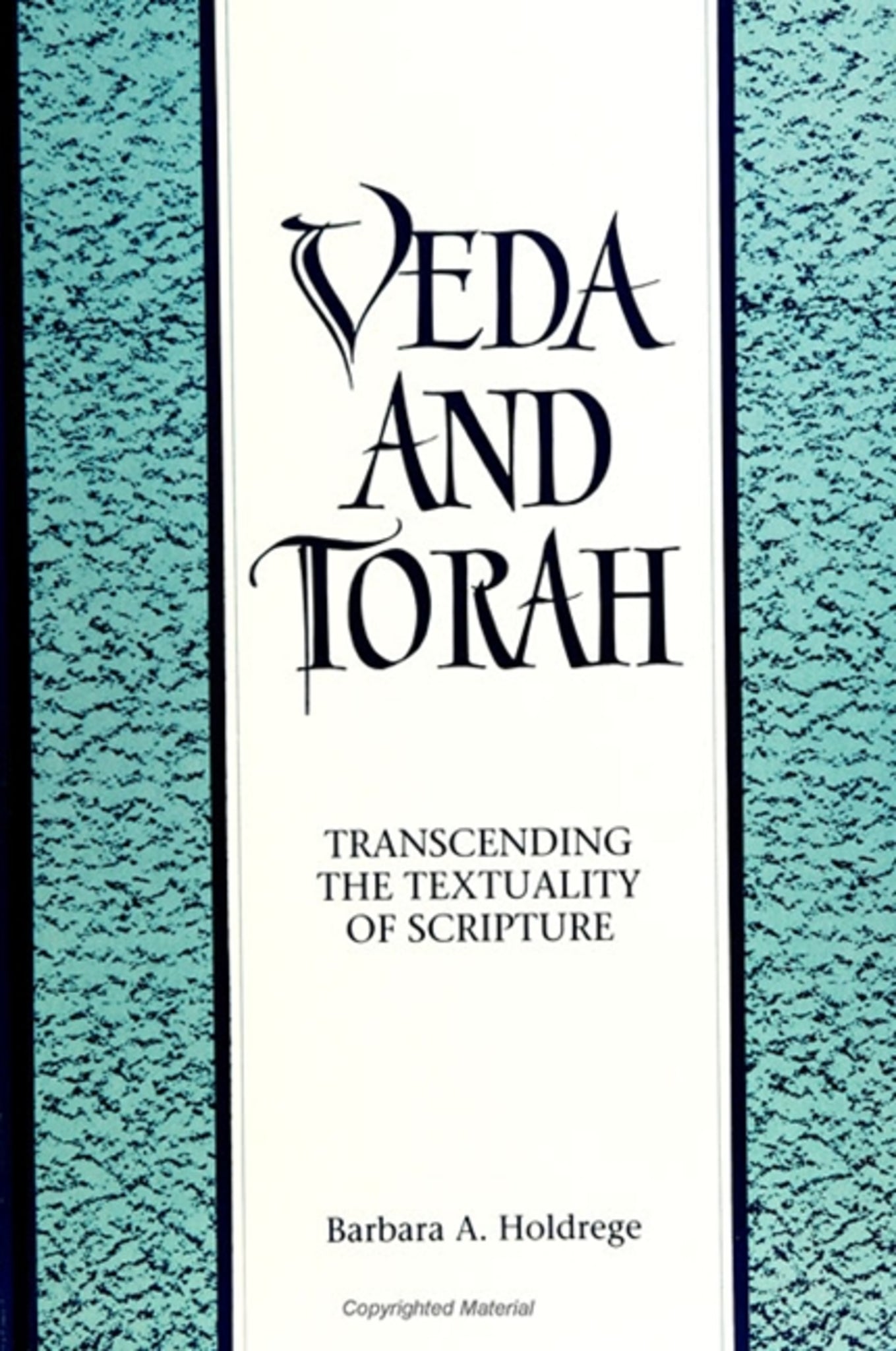We're sorry. An error has occurred
Please cancel or retry.
Veda and Torah

Some error occured while loading the Quick View. Please close the Quick View and try reloading the page.
Couldn't load pickup availability
- Format:
-
16 November 1995

Enlarges our understanding of the term "scripture" through a comparative study of Veda and Torah.
In Veda and Torah, Barbara Holdrege offers a groundbreaking study of two of the world's most revered spiritual traditions. This scholarly work delves into the Veda and the Torah not just as sacred scriptures, but as complex systems of meaning, each with its own symbolic context and history of interpretation. By approaching the Veda and the Torah as dynamic, living traditions rather than static texts, Holdrege expands our understanding of what constitutes scripture and how these texts function within their respective religious and cultural worlds.
Holdrege explores the profound relationship between word and creation in both traditions, examining the role of sacred texts in shaping cosmology and the human experience of the divine. From the Vedic concepts of creation and cognition to the Torah's role in revelation and spiritual practice, the book offers a nuanced comparative analysis that bridges the intellectual and theological divides between Hinduism and Judaism. By engaging with diverse sources—from Vedic mythologies and post-Vedic philosophical systems to Kabbalistic teachings and Midrashic exegesis—Holdrege provides a rich, multi-dimensional view of these traditions' sacred writings.
The book is divided into three thematic parts: "The Word in Creation," "From Word to Text," and "Text in Practice," each of which draws on detailed textual analysis and comparative studies. Holdrege illuminates how both Veda and Torah serve as more than texts—they are vibrant, living forces that shape religious practice, authority, and identity. This work is essential reading for scholars of religion, comparative theology, and philosophy, as well as those interested in the intricate ways sacred words shape our world.


"In this book Barbara Holdrege has set a high standard for comparative work and has made an important contribution to both Hindu and Jewish studies. She has looked at Veda and Torah not simply as 'scripture,' but as systems of meaning, symbol systems, each with its own affiliated meanings, each with its symbolic context, and each with its history of interpretation. By addressing the whole complex in which Veda and Torah have been transmitted and by seeing their uses and interpretations in the traditions that they enliven, Holdrege has problematized and expanded the usage of the term 'scripture' and has enriched the possibilities for significant comparative study." —Diana L. Eck, Harvard University
"I found Holdrege's knowledge and treatment of the Hebrew material exemplary. There can be no doubt that she has made a fascinating contribution in her analysis of the Hebrew texts in themselves, in her conceptual treatment of the notion of 'text' in Judaism, and in her instructive comparison of the Jewish and Hindu attitudes concerning this topic. In this latter domain I see her book as pioneering. Especially remarkable is the fact that in her treatment of Jewish religion she resorts to a large spectrum of Jewish corpora, beginning with Midrashic texts and ending with Kabbalah." —Moshe Idel, Hebrew University
"This book is a remarkable piece of scholarship. The way in which the author employs traditional, text-based methods to enlarge scholarly understanding of what 'texts' are is revolutionary. The author demonstrates that scriptures are not just texts, one kind of religious medium alongside others, but constituent parts of religious and cultural life in ways that have been previously unappreciated and that will clearly be of interest to anthropologists and semioticians, as well as to historians and comparativists of religion." —Thomas B. Coburn, St. Lawrence University
"Holdrege has produced a unique piece of work: one that is equally learned and scholarly in two completely different religious traditions. This is a remarkable achievement in and of itself and offers the possibility for a comparative study that is vastly more informed than what has passed for comparative religion in the past. Holdrege addresses some of the most important questions in the study of religion in this work: What are the sources of authority and legitimation in any given religious tradition? How are those sources—the 'canons' of religious traditions—represented, and how are they appropriated and reappropriated in the process of legitimating religious change? Her answers to these questions are informed, interesting, and significant contributions to the field of religious studies as a whole." —Brian K, Smith, University of California, Riverside
Preface
Introduction
Part 1 The Word in Creation
1 Veda and Creation
Veda and Creation in Vedic Texts
Veda and Creation in Post-Vedic Mythology
Veda and Creation in the Darsanas
2 Torah and Creation
Torah and Creation in Pre-Rabbinic Texts
Torah and Creation in Rabbinic Texts
Torah and Creation in Kabbalistic Texts
Comparative Analysis 1
Veda and Torah in Creation
Part 2 From word to text
3 Veda and Cognition
Veda and Cognition in Vedic Texts
Veda and Cognition in Post-Vedic Mythology
4 Torah and Revelation
Torah and Revelation in Rabbinic Texts
Torah and Revelation in Kabbalistic Texts
Comparative Analysis 2
Cognition of Veda and Revelation of Torah
Part 3 Text in practice
5 Veda in Practice
Recitative Transmission of the Vedic Samhitas
Theurgic Conceptions of Vedic Sacrifice andRecitation
Interpretation of the Vedas
Appropriation of the Veda
6 Torah in Practice
Written Transmission of the Sefer Torah
Interpretation of the Torah
Theurgic Conceptions of Torah Study and Practice
Appropriation of the Torah
Comparative Analysis 3
Veda and Torah in Practice
Conclusion
Notes
Abbreviations
Note on Translation and Transliteration
Selected Bibliography
Index



